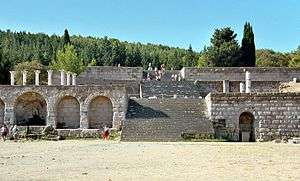Cos (city)
Cos or Kos (Ancient Greek: Κῶς) was a city of ancient Greece on the island of the same name.[1] In 366 BCE, the inhabitants of the town of Astypalaea abandoned their town to populate Cos.[2][3] Cos was a member of the Dorian Pentapolis, whose sanctuary was on the Triopian promontory.[4] Under the Athenian rule it had no walls, and it was first fortified by Alcibiades at the close of the Peloponnesian War.[5] In subsequent times it shared the general fate of the neighbouring coasts and islands. Antoninus Pius rebuilt the city, after it had been destroyed by an earthquake.[6]




References
- Richard Talbert, ed. (2000). Barrington Atlas of the Greek and Roman World. Princeton University Press. p. 61, and directory notes accompanying.
- Strabo. Geographica. xiv. p. 658. Page numbers refer to those of Isaac Casaubon's edition.
- Stephanus of Byzantium. Ethnica. s.v. Ἀστυπάλαια.
- Herodotus. Histories. 1.144.
- Thucydides. History of the Peloponnesian War. 8.108.
- Pausanias. Description of Greece. 8.43.1. et seq.
- Lund University. Digital Atlas of the Roman Empire.
![]()